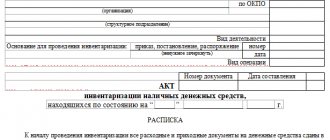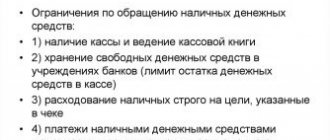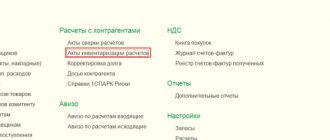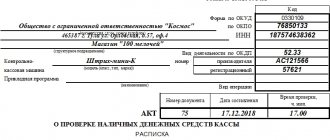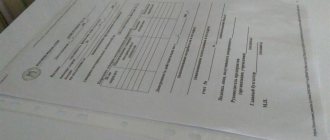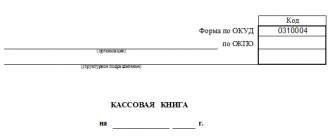How to spend a shortage at the cash register
The culpability of the cashier in case of shortcomings can be discussed, but for accounting, meager numbers that process funds are important. Three wiring options are considered.
The employee compensated for the deficiency. The amount is posted under the item “Other expenses” for the reporting period, which was recognized as such by the court or the debtor:
- debit 94, credit 50 - shortage and loss of valuables;
- debit 73-2, credit 94 - attributing the amount of damage to the guilty party;
- debit 70, credit 73-2 - deduction of funds from the employee’s salary.
The procedure for collecting shortages
- Detection of monetary discrepancies in the cash register and in papers.
- Request an explanation from the cashier. In case of failure to provide or direct refusal to draw it up, a special act must be written with the signature of two witnesses.
- Issuance by management of an Order (instruction) to compensate for the shortage.
- For a cashier who agrees to voluntary compensation, the amount of the shortfall will be written off from the next salary, or he will deposit the money into the cash register himself. You can agree on an installment plan.
- If the cashier refuses a refund or if the amount is large, management goes to court.
NOTE! The employer may, after considering the circumstances and the cashier's explanation, completely waive the requirement for compensation at any stage, partially or in full.
When the cashier is not to blame
The law stipulates certain circumstances that remove guilt and financial responsibility from the cashier. These include:
- a natural disaster as a result of which the cash register was damaged and funds were lost;
- another act of force majeure independent of the cashier (robbery, theft of funds during transportation or transfer to/from the bank).
In this case, the act of shortage is recorded, in addition to the usual emergency inventory procedure, also by an act of law enforcement agencies.
Is the cashier obligated to compensate for shortfalls in the cash register?
The position of a cashier involves enormous responsibility, but the responsibilities in this profession must be precisely correlated with the rights. Both excess and shortage are not always the fault of the cashier, since there are many situations that can lead to a difference between the amount at the cash register and the settlement amount.
In any case, the cashier, as a financially responsible person, is obliged to pay for his miscalculations from his own pocket. If there is a minus at the cash register, the cashier must fully reimburse the missing amount. These actions are regulated by articles 242 and 243 of the Labor Code of the Russian Federation. The reason for the shortage in the cash register is not important - whether the employee made a mistake accidentally or intentionally, he must compensate for the damage.
Did you know?
If the amount of the shortfall is less than the employee’s monthly salary, then the employer can recover it without the consent of the person who was at fault.
Financial penalties are not the only type of punishment for improper performance of work duties. In accordance with Articles 192 and 193 of the Labor Code, the employer has the right to take disciplinary action against a negligent employee. This could be a warning, a reprimand, and in extreme cases, dismissal. Of course, an adequate leader must weigh the pros and cons before making a fateful decision.
conclusions
The cashier of the organization is a financially responsible entity. It is he who fully compensates for the cash shortage.
Catastrophes and force majeure that lead to loss/shortage of cash are considered as exceptions that allow the cashier to be exempt from paying damages.
Shortages are often discovered during cash inventories. The facts of their identification and compensation are correctly documented and are also subject to accounting. Those responsible for the damage are identified through investigations.
| Didn't find the answer to your question in the article? Get instructions on how to solve your specific problem. Call now: 7 (499) 490-27-62 — Moscow — CALL 7 St. Petersburg — CALL 8 ext.849 – Other regions – CALL here and get an answer in 5 minutes It's fast and free! |
Who can identify the shortage?
A shortfall is an identified negative discrepancy between financial accounting indicators and the actual amount of cash in the operating cash register.
NOTE! If there are more funds than would be due according to the documents (positive discrepancy), we are talking about surpluses going to the organization’s profit.
Who and during what procedures can detect such a discrepancy? The most common shortages are:
- the cashier-operator himself;
- an employee performing cashier functions;
- the cashier's immediate superiors;
- inventory commission;
- auditor checking the cash register;
- founders or shareholders of the company;
- senior management;
- auditors during an external audit.
All these persons have the right to reconcile accounting data and count cash in the cash desk at the required time on the basis of paragraphs 37 and 38 of the Procedure for conducting cash transactions in the Russian Federation, approved by decision of the Board of Directors of the Bank of Russia dated September 22, 1993 No. 40.
How to avoid?
In order to prevent the occurrence of cash discrepancies, the company’s management must do everything possible to prevent the probable causes of shortages:
- Correctly organize and equip the cash register premises.
- Be careful in selecting, checking, and instructing cashiers.
- Minimize external influences from natural and other factors that can damage the cash register.
- Ensure reliable security of the cash register and cash drawers.
- Adhere to strict standards and principles of cash discipline.
Types of liability for shortages
- Full financial responsibility. This implies reimbursement of the entire missing amount at the expense of the cashier. If the amount that needs to be reimbursed is no more than the average monthly salary of the culprit, then he must reimburse it by order of management, issued no later than a month from the date of discovery of the shortage. Large sums can only be recovered through judicial proceedings. The employer has a year to go to court on this matter.
- Administrative penalty. The cashier, through his action, inaction or negligence, violated the procedure for handling cash, which means he may be subject to administrative liability. Officials can pay 4–5 thousand rubles, and legal entities – 40–50 thousand rubles. - this is in addition to compensation for the amount of the shortfall itself.
- Disciplinary action. May also be imposed by the employer, in addition to damages. A careless cashier can be reprimanded, reprimanded, and in some cases fired without mercy.
- Criminal liability. Threatens those officials in respect of whom the intent of their actions has been proven. Such guilty actions are recognized as:
- theft - secret appropriation of someone else's property;
- fraud - the acquisition of rights to someone else's funds due to abuse of trust or deception;
- embezzlement – theft of entrusted property or funds and subsequent sale, use, transfer to third parties;
- misappropriation – unlawful retention of entrusted assets for one’s use.
ATTENTION! You will have to file a claim in court if the cashier does not agree to voluntarily pay the funds, as well as after the expiration of the established month.
These actions are punished, depending on the severity, the possibility of relapse and the category of the guilty employee, either by a fine, or by compulsory or correctional labor, or by restriction of freedom, arrest or prison. The specific time limits depend on the type of criminal act.
Criminal liability for lack of money in the cash register
IMPORTANT INFORMATION! For any act that provides for criminal liability, the perpetrator can be dismissed at the initiative of the employer.
What document is used to document a shortage at the cash register?
Usually, the shortage is discovered when the cashier prepares a Z-report in the presence of the responsible persons of the organization (manager, chief accountant or other persons authorized by them). The amount must match the amount of cash. The error can also be detected during the day's operations, when revenue is compared with the morning X-report data. Such information can be collected during the operating day both as a whole and by sections of the organization.
Important!
When reading information from a cash register during the day, its counters provide data but are not reset.
Once a shortage is detected, the cash register is subject to inventory. The modern legislative framework does not stipulate the need for such actions; probably, entrepreneurs are still given some kind of freedom to manage their funds. But, based on simple human logic, it is still worth checking the correctness of the operations. In case of discrepancy, an act is drawn up at the cash desk in the INV-15 form, which is drawn up by the inventory commission.
How are discrepancies between the actual and accounting balances at the cash desk identified?
Any person engaged in servicing or counting cash can identify a shortage of cash. In particular, this can happen:
- When withdrawing revenue daily at a retail outlet or at the cashier’s place;
- When checking cash balances by managers or authorized employees of the company;
- During the audit;
- During the inventory process.
Detection of a shortage of cash at the cash register always requires a thorough investigation, determination of the causes of this incident and the adoption of subsequent adequate measures.
What should an employer do if a lack of funds is identified?
In most cases, cash shortages are identified during an inventory count. This procedure is an integral part of the work of almost every organization.
What to do if there is a shortage of inventory items identified during inventory?
In the process of its implementation, the recalculation and assessment of material assets and money related to the company’s property is carried out.
In addition, shortages are identified as a result of unplanned inspections. The need for them is due to the following factors:
- change of financially responsible person;
- natural disaster, emergency;
- change of owner of the enterprise;
- the likelihood of theft of company property.
If, during an audit of the cashier’s work, the employer identified a shortage, he needs to take a number of actions. The first thing to do is demand an explanation from the cashier.
He is given 2 days to provide an explanation of the situation. The employer's request can be documented or expressed orally. An employee’s refusal to testify must be documented in a document.
Subsequently, the employer conducts an investigation. Based on its results, the culprit is determined, as a result of whose action or inattention the shortage arose. If a penalty is imposed on him, an order is drawn up.
What to do if you find a shortage in the store?
Possible reasons for lack of cash
The shortage is not always associated with the dishonest attitude of responsible employees to their work.
Other factors may be responsible for this phenomenon.
The main reasons for the lack of money in the cash register:
- theft. The most common circumstance. Any person who has access to the cash register can commit theft;
- unforeseen circumstances. For example, a natural disaster. As a result of this phenomenon, material assets can be lost or damaged without human participation;
- re-grade Selling an item at an invalid or lower price. Often this error occurs if a company sells several types of one product;
- production costs. Products can be damaged without anyone's fault.
It is important to take into account that for each type of shortage there is a certain limit, so minor shortages of funds in the cash register are normal.
Is the cashier required to refund the money?
A cashier is an employee whose professional activity involves working with cash. He has a huge responsibility.
The Labor Code of the Russian Federation and the Resolution of the Ministry of Labor reflect a list of positions in relation to which the full type of financial liability must be established. This means that if violations are detected, employees are obliged to fully compensate the employer for all damages.
The position of cashier is included in the specified list.
The amount of the shortage can be attributed to the cashier in full, since responsibility for the lack of cash in the cash register rests with this employee.
This rule is regulated by Article 242 of the Labor Code of the Russian Federation.
The cashier is not obliged to pay compensation to the employer if the shortage was caused by factors beyond his control. These are:
- a disaster or other similar event during which the cash register was damaged;
- force majeure - robbery, theft, etc.
Who takes inventory of the cash register?
To carry out the inventory, a permanent inventory commission is created. When there is a large volume of work, working inventory commissions are created to simultaneously carry out an inventory of property and financial obligations (based on clause 2.2 of Methodological Instructions No. 49).
The composition of permanent and working inventory commissions is approved by the head. Documents on the composition of the commission can be an order, resolution, order, etc. (based on clause 2.3 of Methodological Instructions No. 49).
The inventory commission includes:
- representatives of the organization's administration;
- accounting employees;
- representatives of the internal audit service or employees of independent audit companies;
- security officers or other company specialists (economists, managers, etc.).
It should be borne in mind that the absence of even one approved member of the commission during the inventory serves as a basis for declaring its results invalid (the basis is clause 2.3 of Methodological Instructions No. 49).
Regulatory documents do not oblige the annual reissue of the order on the composition of the inventory commission if there have been no personnel changes in the organization.
It's always the cashier's fault
The cashier is entrusted with storage of material assets (in this case, cash proceeds) on the basis of an employment contract concluded with him.
Art. 242 of the Labor Code of the Russian Federation states that in such situations the employee bears full financial responsibility for compensation for lost funds. A Art. 244 stipulates the legality of concluding such an agreement with employees holding the position of cashier if they have reached the age of majority. In addition to cashiers, full financial responsibility falls on some other categories of workers provided for by Resolution of the Ministry of Labor of Russia No. 85 of December 31, 2002.
BY THE WAY! In the event of damage to the company, the cashier may be guilty not only of unlawful actions, but also of inaction, as well as negligence and dishonesty in relation to his own labor duties.
Sellers' liability
The consequences of shortages for sellers depend on the preparation of basic documents - an inventory act (report) and an agreement on collective liability.
It is also important whether the accused employee can prove his innocence or violations on the part of the employer (for example, all conditions for normal work and the safety of entrusted valuables were not created).
If you want to find out how to solve your particular problem, please contact us through the online consultant form or call:
- if such responsibility is imposed on the employee by the provisions of labor legislation (the employee occupies a certain position specified in the law) or a separate collective agreement;
- the damage was not caused during the performance of work duties (an excellent example of such a violation is the use of official transport during non-working hours by a person to whom this transport was entrusted according to official duties).
We invite you to read: Is the driver required to carry a printout of the electronic MTPL in 2020?
That is, only the employee who bears financial responsibility can be held responsible for the shortage.
Refund Methods
The technology for returning missing funds to the cash desk depends on the amount of the shortage and other related factors.
If the cashier has the appropriate ability, he must pay off the debt one time.
In case of significant shortage, payment by installments is possible.
It is important that in this way the collection of funds is carried out only with the consent of both parties to the employment relationship.
A certain amount may also be set that will be withheld from the employee’s salary until the full amount lost is returned.
If there are disagreements or the cashier refuses to compensate for losses, the employer has the right to go to court.
How to write off the identified lack of money?
In order for the shortage identified as a result of checking the cashier’s work to be written off or attributed to the cashier’s account, it is necessary to ensure that the following documents are available:
- A report on the correctness of the inspection, during which the deficiency was identified.
- Collation statement.
- Inventory result record sheet
- Explanatory note from the cashier.
- Order from the manager to impose a penalty.
- Decision of the judicial authority (if any).
- Resolution to suspend the investigation of the situation (if the culprit is not found).
Also, some changes are reflected in accounting. All shortages must be written off to the debit of account 94, which has the appropriate name - “Shortages and losses from damage to valuables.”
Documenting
The lack of money in the cash register is classified as an expense. To establish it, an inventory is carried out, the results of which reveal the reasons for the lack of funds in the cash register.
At the end of the procedure, the responsible employees draw up a report drawn up according to the unified form INV-15.
The report is prepared in several copies. One is transferred to the accounting department, the other remains with the cashier.
The head of the organization draws up an act with the help of which he notifies the employee about the misunderstanding that has occurred.
Within a few days, employees who, according to preliminary data, are guilty of identifying the deficiency must provide written explanations.
If at the end of the specified period the explanatory note is not provided to the manager, a statement of refusal is drawn up.
The fact that a shortage is identified is also reflected in accounting. For this purpose, a special account 94 has been created, which has the appropriate name - “Shortages and losses from damage to valuables”. Also, shortages may be reflected in account 50 - “Cash”.
After receiving/not receiving the cashier’s explanations, the employer conducts an investigation into the situation.
Based on its results, the fact that the cashier is guilty is confirmed or refuted.
If an employee is found guilty, he is subject to a financial penalty.
For this purpose, the manager issues an appropriate order.
A document of this type reflects information about the violator, the date the deficiency was discovered and the conditions under which it was discovered. The amount of the shortage and the method of compensation are indicated.
Accounting and postings
If during the inventory a shortage of funds in the cash register is revealed, then the corresponding entries are reflected in the accounting records.
Accounting accounts to reflect the shortage identified at the cash register are selected depending on how the discrepancy is written off.
If the employer demanded reimbursement of this amount through the court, the corresponding legal costs of the organization can legally be attributed to non-operating costs.
As for the accounting of shortages, its specifics will depend on the guilt of the cashier and the nature of compensation (write-off) of the corresponding damage.
| Operation (description) | Debit | Credit |
| Cash shortage detected in a certain amount | 94 | 50 |
| The amount of the identified discrepancy is attributed to the culprit | 73/2 | 94 |
| Compensation for damage by the culprit | 70 | 73/2 |
| Operation (description) | Debit | Credit |
| Cash shortage detected in a certain amount | 94 | 50 |
| The amount of the identified discrepancy is attributed to the culprit | 73/2 | 94 |
| The shortage is written off as irreparable damage | 91/2 | 94 |
| Operation (description) | Debit | Credit |
| Cash shortage detected in a certain amount | 94 | 50 |
| The shortage is written off without identifying the culprit | 91/2 | 94 |
Conditions for employee liability for cash shortages
When signing an employment contract with a cashier (senior cashier, controller), an agreement on full financial responsibility must be concluded. The employees with whom this agreement can be concluded, as well as the positions, are recorded in Resolution of the Ministry of Labor of the Russian Federation No. 85.
Systematic checks will allow you to identify shortages of funds in the cash register. The audit is carried out by a commission. Its composition is approved by order of the head of the organization.
Members of the commission, in the presence of the person bearing financial responsibility (cashier, controller), must count the funds available in the cash register. Next, a comparison is made of the balance available in the cash register with the balance of money indicated in the cash book. The commission confirms the fact of the shortage. Based on the results of the audit, a cash inventory report is drawn up in the INV-15 form. It should indicate:
- financially responsible person;
- composition of the commission;
- the amount of funds in the cash register, as well as funds according to accounting documents;
- inventory results;
- explanation of the reasons for the shortage;
- decision of the head of the organization.
The employee is required to provide a written explanation. If he refuses to give such an explanation, a statement of refusal is drawn up.
Thus, a shortage was identified at the cash register. What should the management of the organization do in this case?
What should an employer do with a shortage of money identified during an inventory?
As a rule, a cash shortage in an organization is identified through an inventory of its operating cash desk.
This procedure is regularly carried out by the business entity according to the established regulations.
The need to carry it out at an enterprise may be due, for example, to the preparation of annual financial statements or other reasons.
First of all, the compliance of actual cash balances with the information recorded in the accounting registers is checked.
In addition, an economic entity may carry out an unplanned inspection of its own cash register. Such an event also often helps to identify cash shortages.
Unscheduled audits are carried out in relation to the cash register of an enterprise for the following possible reasons:
- The presence of reasonable suspicions about the possible theft of the organization’s assets.
- The owner of a business entity has changed.
- An emergency, a natural disaster, has occurred.
- The materially responsible entity has changed.
If the employer has initiated another check of the cash register and established the fact of a shortage of cash, he should implement a number of specific measures on this basis.
First, you need to obtain appropriate explanations from the authorized cashier.
To provide management with the necessary explanations regarding the detected shortage, the employee in charge of the cash register has only two days.
The employer has the right to formulate this requirement by oral order or written document.
If the cashier refuses to provide management with any explanations about the current situation, the fact of such refusal must be documented - a special act is drawn up.
The next stage is for the employer to conduct the necessary investigation. The purpose of this event is to find out the reason for the detected discrepancy and find the entity responsible for the cash shortage.
If, based on the results of the investigation, the management of the organization was able to reliably identify the responsible person (employee) whose action/inaction led to the loss of cash, an appropriate penalty should be imposed on the guilty party.
In this case, you must be guided by the norms of current legislation. If such a penalty is imposed, this fact must be documented in a separate order.
Procedure for compensation of shortages
If an employee who has a shortage is identified agrees to compensation for damage, funds are deducted from his salary in a lump sum or in installments. Losses are compensated by the employee within the limits of average monthly earnings. If an agreement on full financial liability is concluded with him, the damage can be compensated in full.
No more than 20 percent can be withheld from the salary at a time, if there is a writ of execution - 50 percent.
If the employee refuses voluntary compensation for damage, the commission establishes his involvement in the fact of the crime, and an act of refusal to repay the debt is drawn up, which is sent to the manager. The latter issues an order to withhold money from the culprit’s salary, and the accounting department can make the necessary deductions.
It is important to take into account that damage can be compensated out of court only if a month has not expired from the date of final determination of its amount. Otherwise, recovery is possible only through court.
Main reasons for the shortage
The main trouble for employers is that the losses actually turn out to be greater than the commodity value. After all, this cost can also include the lost profit that the store would have received if the product had been on the counter.
But it is not always the workers who are to blame. It is not at all necessary that the cause of the loss is theft or other criminally punishable and deliberately committed fraud by employees.
Other reasons leading to errors in accounting for goods, affecting profits and, accordingly, shortages, may be:
- Underpricing. This happens if the employer has not adjusted the mechanism for forming the final cost of the goods. If the store actively uses a discount system, it is the main reason for underestimation. In this case, during the audit it is necessary to take into account the difference between the original and discounted costs.
- Inattention of cashiers to the contents of carts. Shoppers place heavier bags at the bottom of carts, requiring store workers to be extremely careful when charging items and checking quantities.
- Due to an oversight, the accounting documents do not take into account goods written off for the store's needs. If any item (goods) was not written off in a timely manner, it must be included as a deficiency when conducting an annual or quarterly audit. As a result, the employer is misled regarding the extent of the loss.
- Damaged goods (purchased with defects or those that have lost their integrity as a result of storage) may also not be written off. Such goods must be registered and written off (a special form is drawn up in Form 13).
Errors during inventory cannot be ruled out. An employee may accidentally make a mistake and not take into account some goods on the shelves.- But even with correct calculations, erroneous data cannot be ruled out and is entered into the report when indicating the inventory number and purchase price. The best way out of the situation would be an extraordinary check to eliminate the possibility of a shortage.
- Another error is related to the delay. The goods are not written off properly (the appropriate form is not filled out) and are counted as a shortage.
- Lack of control over new supplies. In this case, the goods are paid for, but they forget to count them and take inventory. The new batch simply lies in the warehouse and is not taken into account in general calculations.
We invite you to familiarize yourself with: Order on deduction of shortages from wages

